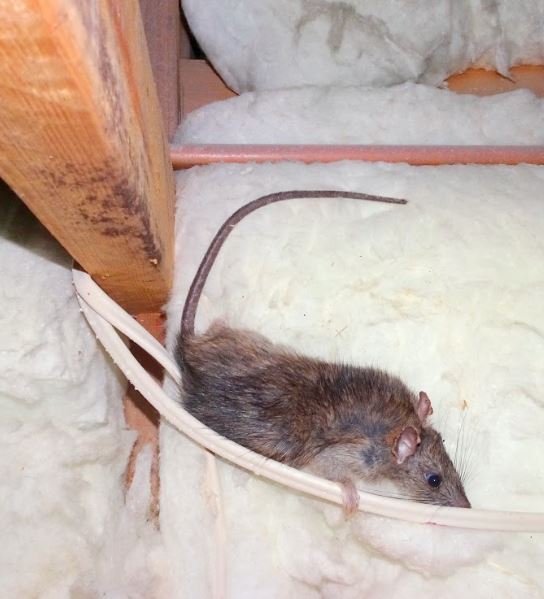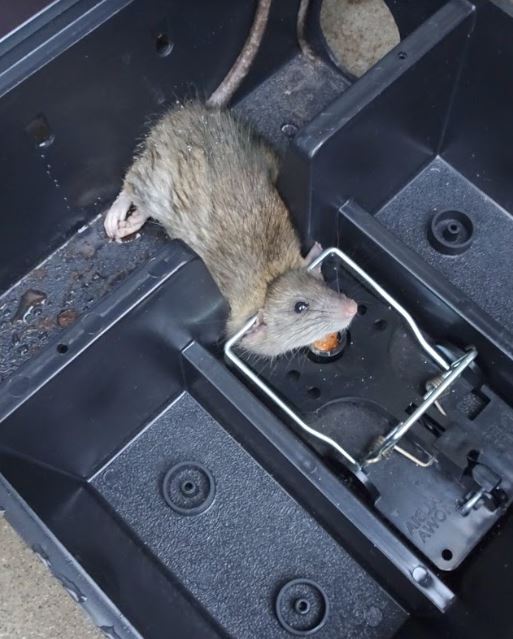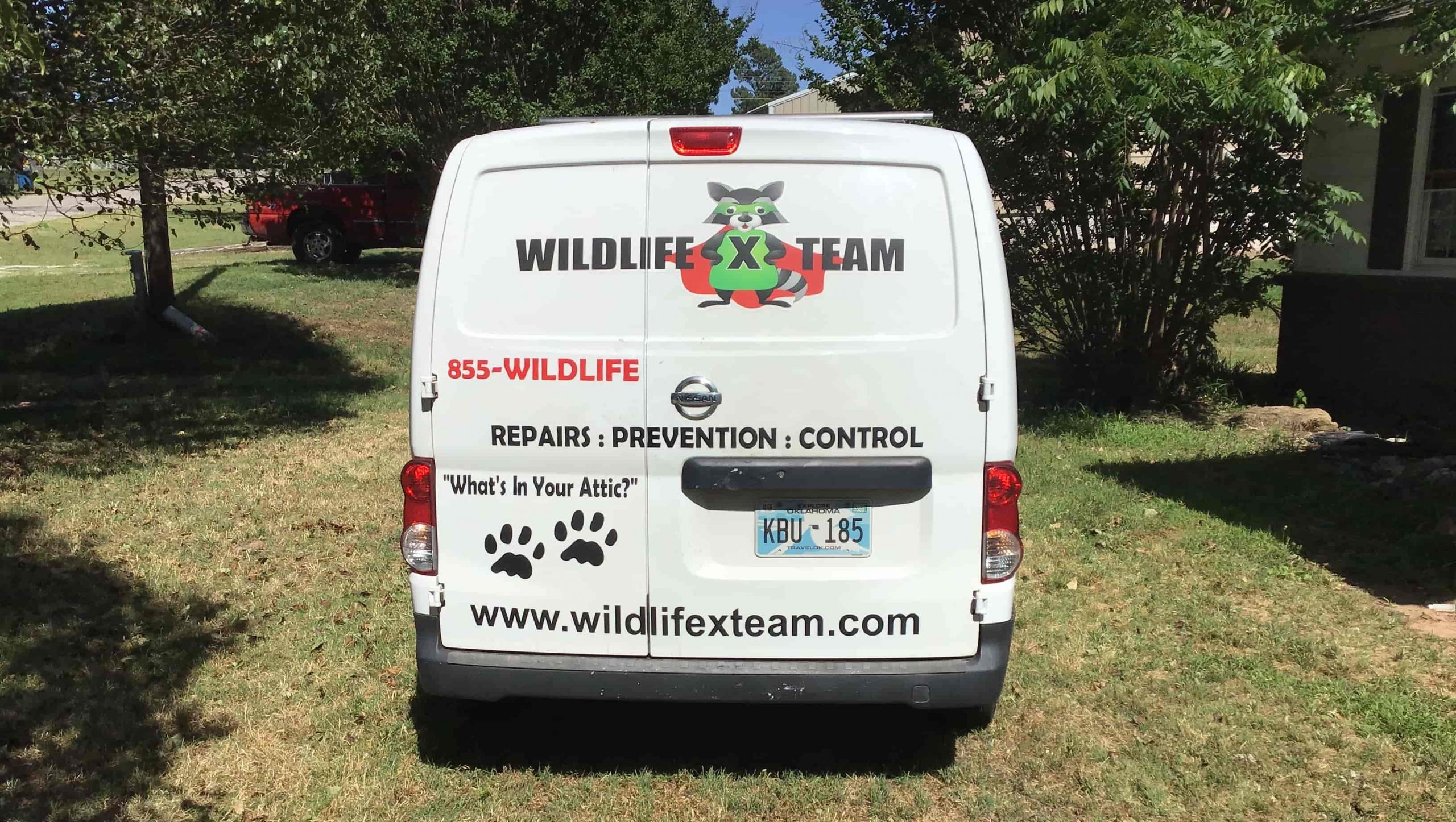
Call for Your Exclusive Wildlife Inspection Report.®
Rodent Removal (Rats & Mice)
Rodents are one of the most resilient species on our planet. Just like humans, they occupy every continent except Antarctica. Right from the start of civilization, over 4,000 years ago, these nasty critters have adapted to reside in human settlements. They have learned to take advantage of the food and shelter we offer them. There are three species of rodents primarily considered as pests. They include roof rats (Rattus rattus), Norway rats (Rattus norvegicus), and house mice (Mus musculus).
Dealing with a rat or mouse infestation is challenging for several reasons. First, due to their high fecundity, a pair of two rats can explode to a population of 1,250 in a year. Second, they are agile, intelligent, highly adaptable, and quite cautious. For homeowners in Tulsa, here are some of the most common problems caused by rats and mice:
- Residing in the attic or crawl spaces.
- Scampering up and down inside walls.
- Contaminating food sources with their saliva, urine, and droppings.
- Chewing on wood, pipes, insulation materials, and electrical wires.
- Risk of diseases like Rat-bite fever, Salmonella, Hantavirus, Leptospirosis, and more.
Their presence can quickly become frustrating for homeowners. But not to worry, Wildlife X Team Tulsa can help you deal with your rodent infestation problem.
Why Do You Have a Rodent Infestation?
Rats and mice are attracted to humans because of the promise of food and shelter.
Food
Rats and mice are omnivores and can feed on almost anything. In the wild, they tend to eat things like plants, fruits, and seeds. However, city rats like to eat meat and garbage. They’ll also feed on pet food, pizza, and just about any human food they can lay their hands on.
Shelter
We all love the comfort of homes when it gets cold outside. Rodents can’t build sophisticated homes, so they have adapted to living in man-made structures, especially during winter. They will reside in the attic, crawlspace, chimney, and even within walls. By residing on your property, they stay in proximity to a variety of food sources.
That’s why at Wildlife X Team Tulsa, we advise homeowners to eliminate all potential food and shelter sources for rodents.
How to Tell If You Have Rats and Mice on Your Property
Asides from sighting these nasty creatures on your yard, there are other tell-tail signs of a rodent infestation:
- Hearing squeaking sounds from the attic or walls.
- Noticing their droppings.
- Greasy rub marks along the paths where they travel.
- Chew marks on several materials, like wood, plastic, and wires.
Get Quote for Your Exclusive Wildlife Inspection Report.®



Humane Rodent Removal
Rodent removal requires an adept understanding of rodent behavior but our wildlife removal experts at Wildlife X Team Tulsa are up to the task. Here’s how we go about rodent removal:
- Sealing Entry Holes
It’s important to first locate all entry holes when dealing with a rodent infestation problem. If not, any captured or killed rodent will quickly be replaced by another. So, that’s why you have to thoroughly inspect your entire property to identify all of their entry holes. Remember, a mouse can get into a hole the size of a penny, while a rat can get into a 20 mm diameter hole. Thereafter, all the identified holes should be sealed with non-chewable steel to prevent reentry. Identifying and sealing all potential entry holes ensures that there’s absolutely no way of them returning.
- Trapping
Trapping is the most effective way of dealing with a rodent infestation – and that’s why we recommend it. However, trapping is an art that requires a good understanding of rodent movement and behavior. Some of the most common baits include peanut butter, bacon, fruits, meats, and cereals. Here are the major types of traps.
Snap traps
This trap delivers a powerful impact through a spring mechanism when the rat or mouse tries to pick up the bait. It is humane because it immediately kills the creature.
Glue trap
This trap contains a strong adhesive on a hardboard. Once a rat or mouse steps on it, it is unable to escape. Since it doesn’t kill the rodent, it is important to check it regularly so the rodent can promptly be killed humanely once it is caught.
Electric traps
This trap delivers a fatal electric shock to the rodent once it captures it.
At Wildlife X Team Tulsa, we advise homeowners to stay away from poison because it is inhumane. It damages the internal organs of the critter. Furthermore, nothing is stopping unintended wildlife, your pet, or children from consuming it. Finally, since a poisoned rodent looks for a secluded area to die, locating the carcass can be challenging.
Decontamination and Repairs
After getting rid of the rats and mice, the next step is to decontaminate the infected space. This involves removing all the remnants like droppings, wood chips, food crumbs and so on that may have accumulated. This helps to prevent the spread of germs and diseases.
Finally, all damaged wood, insulation material, wires, pipes, and other materials have to be repaired. Dealing with the decontamination and repair is best left to professionals like those at Wildlife X Team Tulsa.
At Wildlife X Team Tulsa, we have perfected our methodology to help you deal with your rodent infestation problem.

How To Keep Rats Out Of The Attic?
Rat Problems
Rats are responsible for all kinds of problems, both major and minor. If you find any of these rodents in your home, you should quickly get rid of them before they cause some of the following problems.
- Spread disease. Rats are known to carry dozens of different illnesses, from salmonella to tularemia. You and your household should keep your distance from these animals to avoid contracting any diseases.
- Cause fires. Rodents are known for their sharp teeth and incessant chewing. When in your attic, rats are known to bite on wires which leaves them frayed. These wires can electrocute and burn things, leading to large house fires.
- Damage items. Your attic is full of important things, from furniture to the insulation that maintains your home’s temperature. Rats will chew and rip apart all of these. You should get rid of the rats in your attic to prevent this from happening.
Rat Prevention
There are many proven methods to prevent rats from entering your home. These methods focus on removing attractants and making it more difficult for rodents to find their way indoors.
- Seal garbage. Your trash cans are one of the most common sources of food for wild animals. The smell alone can attract lots of wildlife, including rats. To prevent these animals from taking an interest in your home, you should use animal-proof garbage cans. These keep the smell trapped inside, and they stop curious animals from rummaging through your garbage.
- Store food in airtight containers. A lot of the food you keep in your pantry will attract rodents. These animals have a great sense of smell, allowing them to find anything lying around. By keeping your food in airtight containers, you stop the smell from getting out and make it more difficult for rodents to grab a bite when they find it.
- Repair damage. Rodents get inside your home through tiny holes and gaps as small as one-fourth of an inch. You should scour your home and seal any small cracks and crevices you find in order to stop these animals from getting inside.
- Trim nearby plants. Rats climb nearby ivy and trees to jump onto your roof, which then gives them easy access to your attic. You should trim these plants to ensure a large gap between them and your home, as this will keep rodents away.
- Remove debris piles. Rodents use piles of wood, stone, or leaves as hiding spots. By removing the debris, you leave rats a lot more exposed. This makes them far more reluctant to enter your home.
Rat Removal
Preventative measures address the underlying issues and stop future infestations, but they may not help you if you already have rodents in your attic. For that, you need to use some rat removal tactics.
- Trapping rats. Traps are one of the most effective ways to remove a rodent infestation. Simply place these devices near the rat nest, and you’ll quickly catch a bunch of these animals.
- Poisoning rats. If you’re facing an infestation, it’s tempting to simply kill the animals and be done with the problem. Unfortunately there are several drawbacks to this method that you should keep in mind. For starters, poison rarely kills all the rodents in your home. Even if it does kill them, these animals will often die inside your walls or other hard to reach areas, which gives off a terrible smell and attracts other pests. Finally, poison is dangerous and can harm any kids or pets in your home.
- Calling professionals. Experts will help you remove and prevent rats. Their knowledge and experience lets them efficiently solve your rodent problem, which saves you lots of time and effort. If you’re facing a rat problem, call a local wildlife removal company today.




